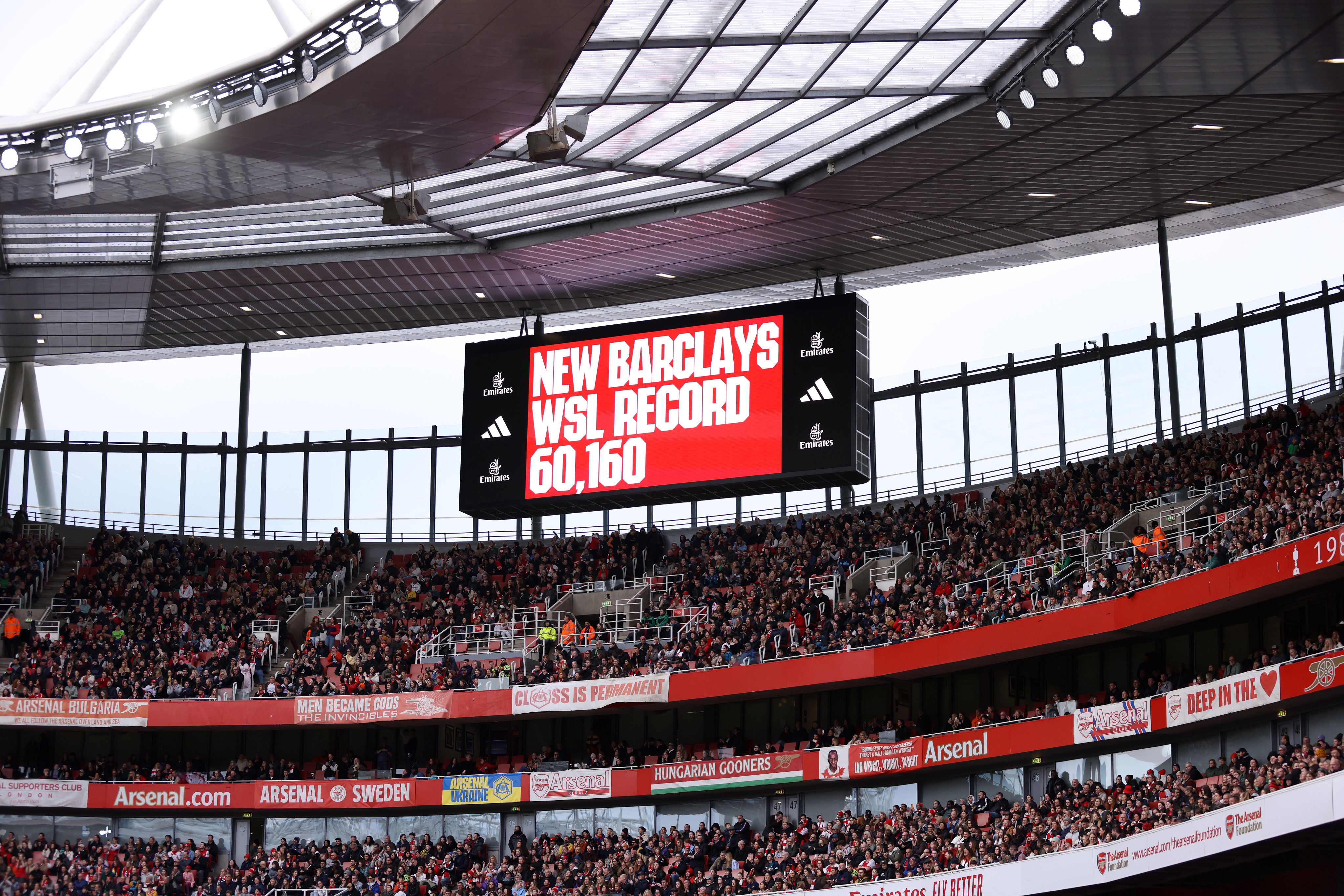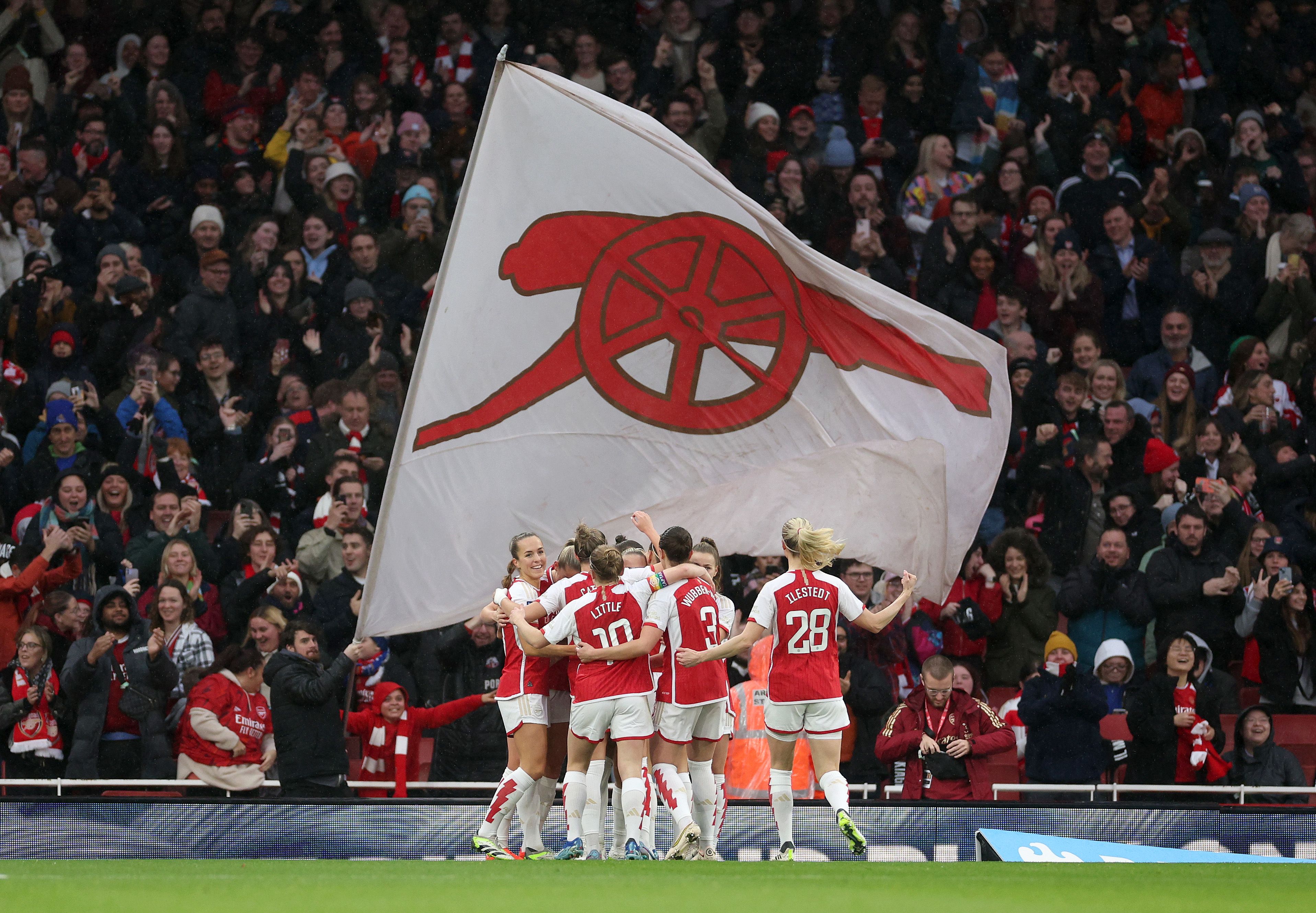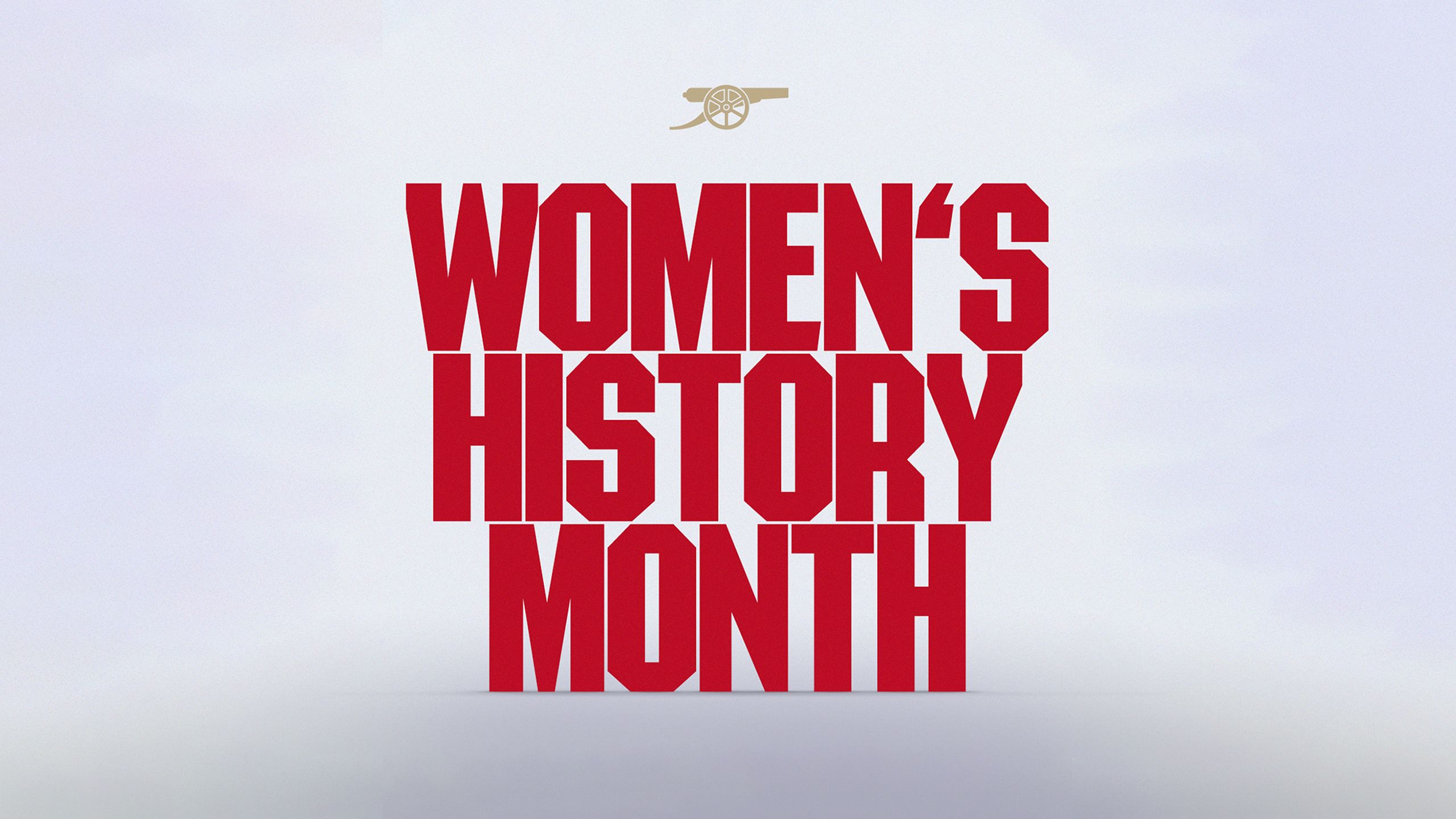
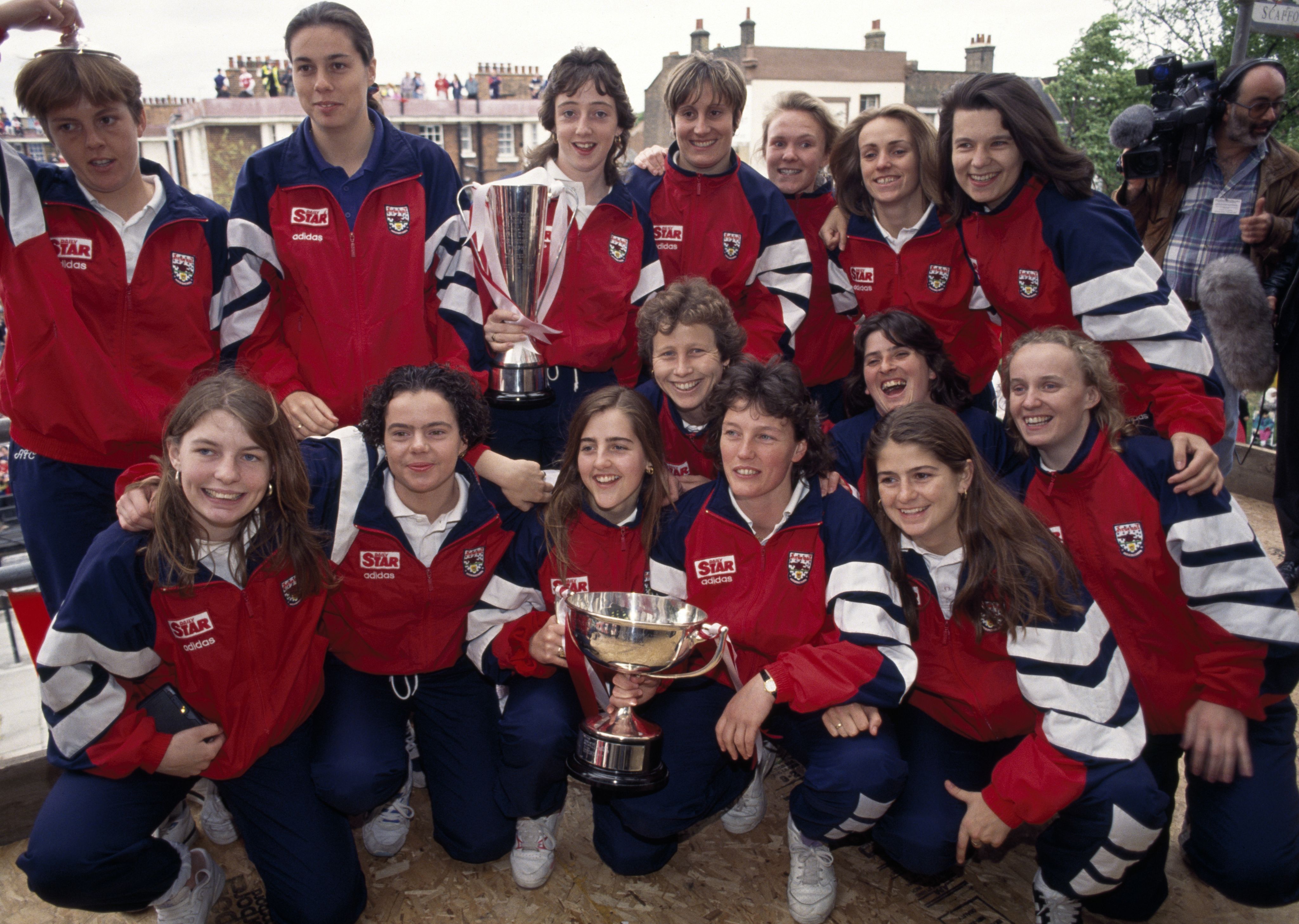

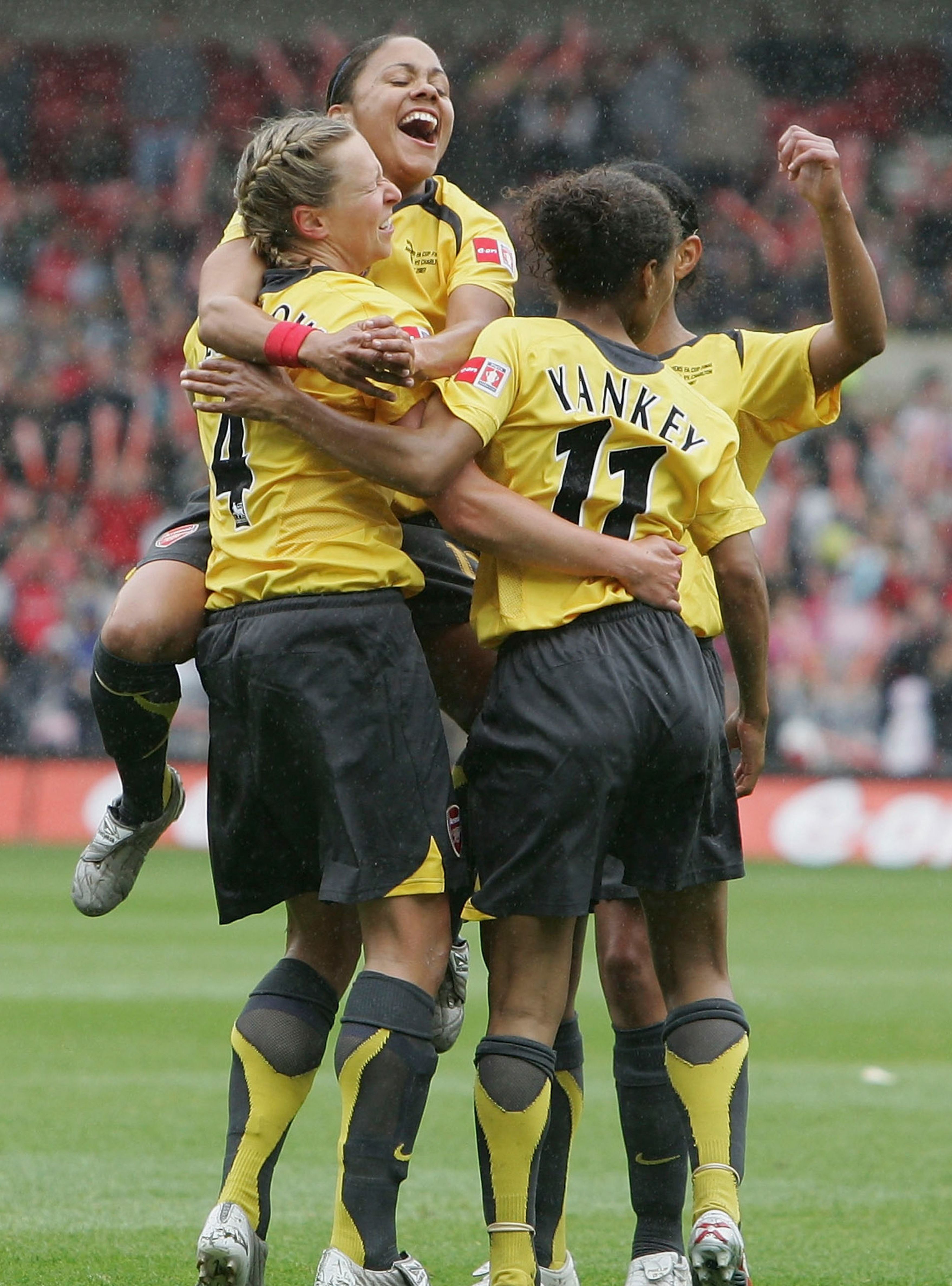
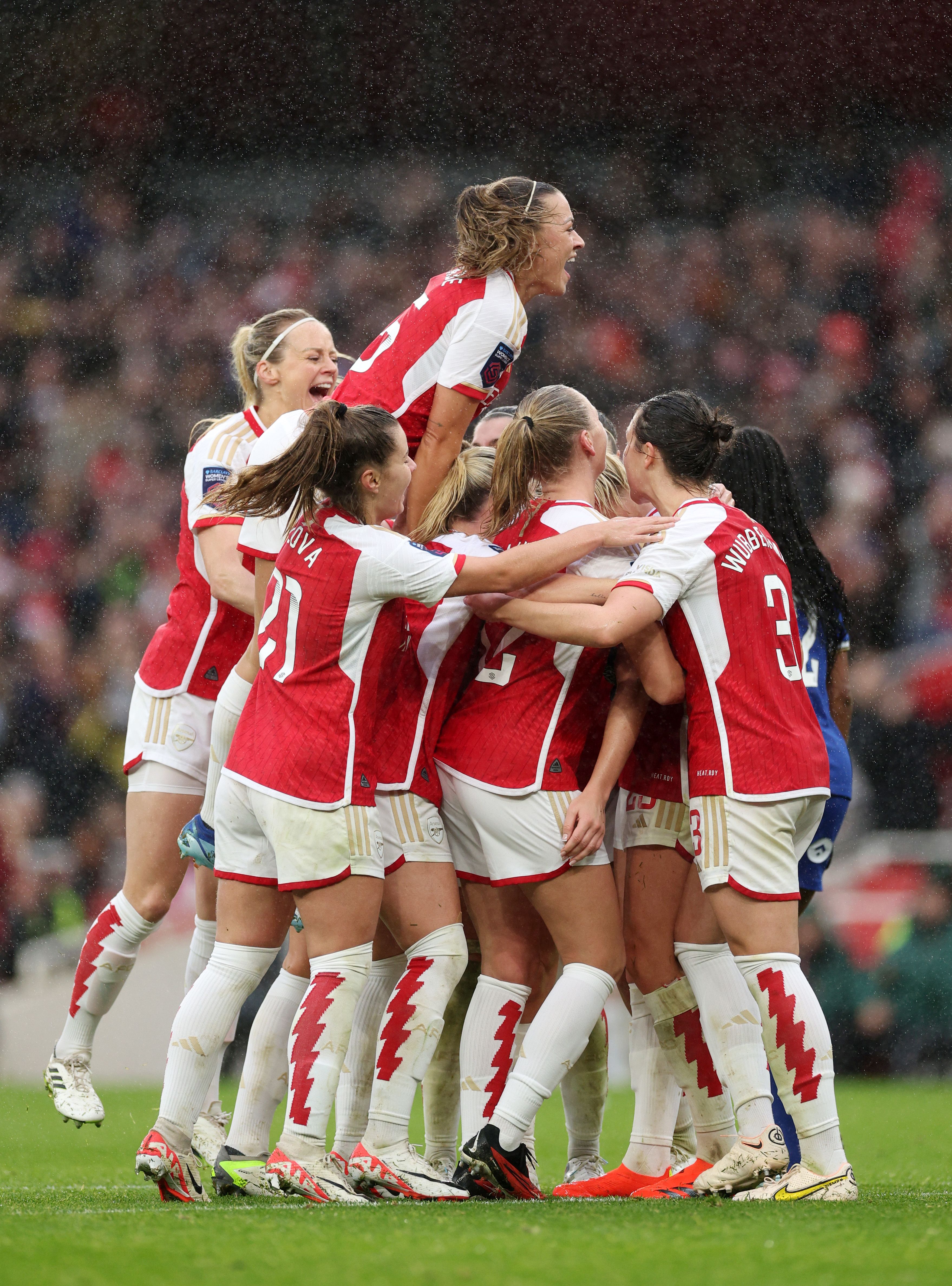
Celebrating Women's History Month
This Women’s History Month, we pay homage to the trailblazing women who helped make this club what it is today, alongside those who are still creating history in front of our eyes.
Throughout March, we’ll share personal stories from players and supporters, as well as deep dives into the archives, to show that there’s not just one way to be a Gooner.
Since our inception 37 years ago, we remain the most decorated women’s football club in England. 60 trophies. A record-breaking 108 games unbeaten. And European glory.
Yet what our teams have achieved goes far beyond the trophy cabinet. The likes of Rachel Yankey, Kelly Smith, Emma Byrne, Jayne Ludlow and countless other legends inspired a generation of footballers to become household names today.
To build for the future, it's vital to remember where you’ve come from.
Women’s History Month began with another historic achievement for the club: back-to-back AWFC sell outs at Emirates Stadium. This north London derby was also notable for its all-female ground staff and technical team, as we work with organisations to provide opportunities for women in football on and off the pitch.
Back in summer 2022, when our very own Leah Williamson captained the Lionesses to Euros victory in front of a sold-out Wembley Stadium, few would have predicted the speed and intensity of the national spotlight. Not only did it help introduce the sport to a brand new audience, it also revived the love of football for thousands of hibernating fans.
But the growth of the game didn’t happen overnight. The foundations of women’s football run deep; they’re built to last.
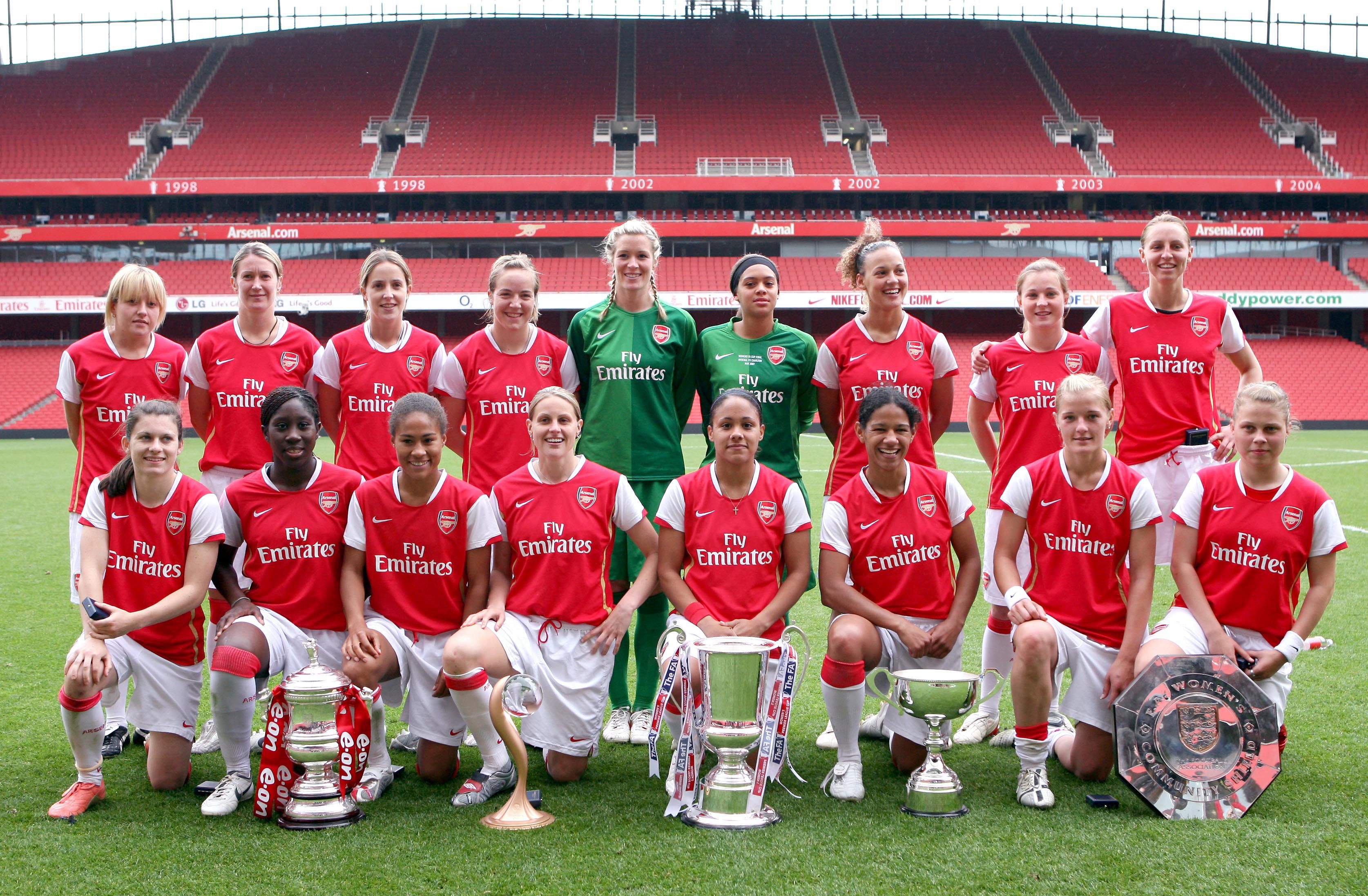

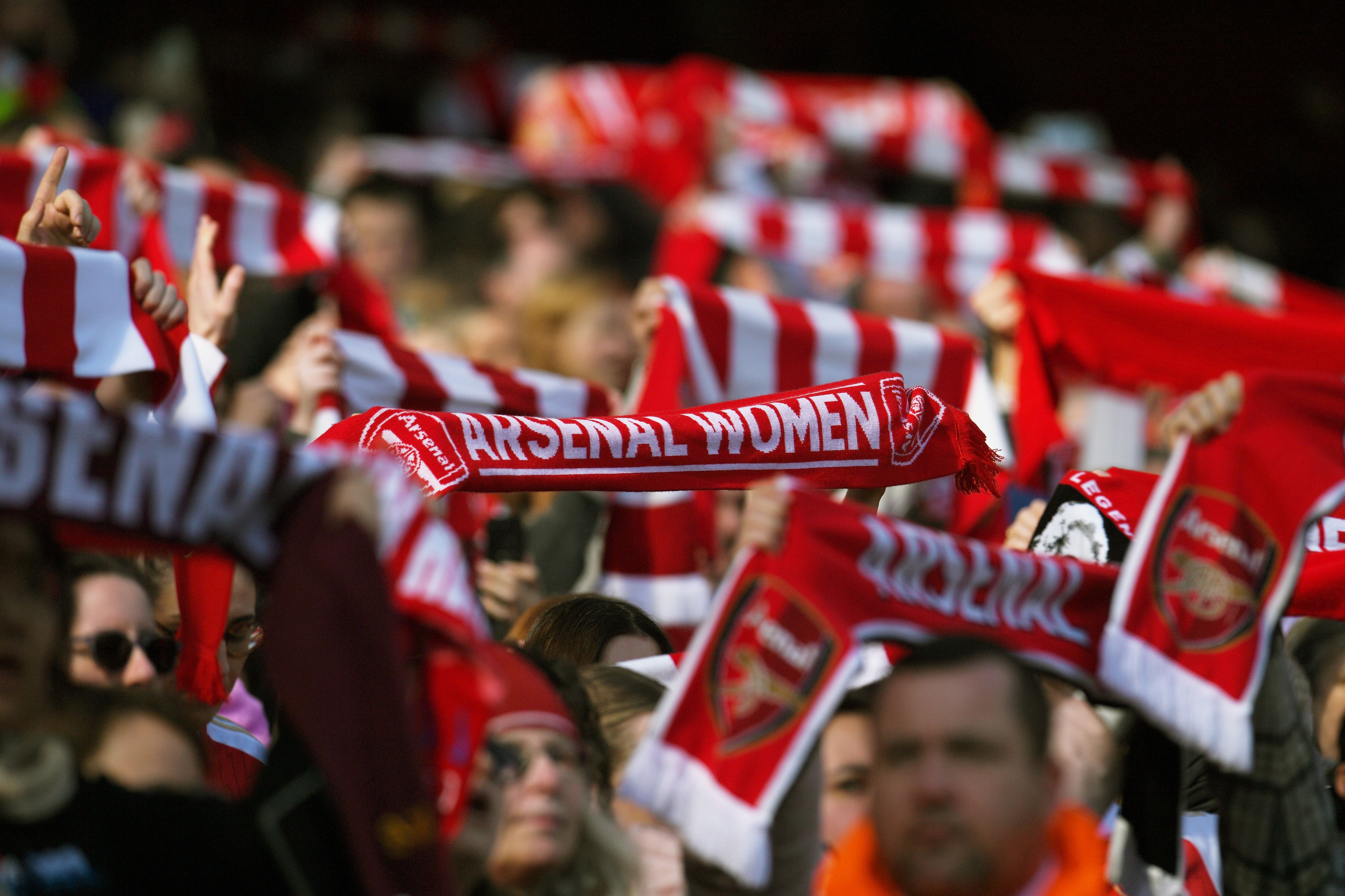
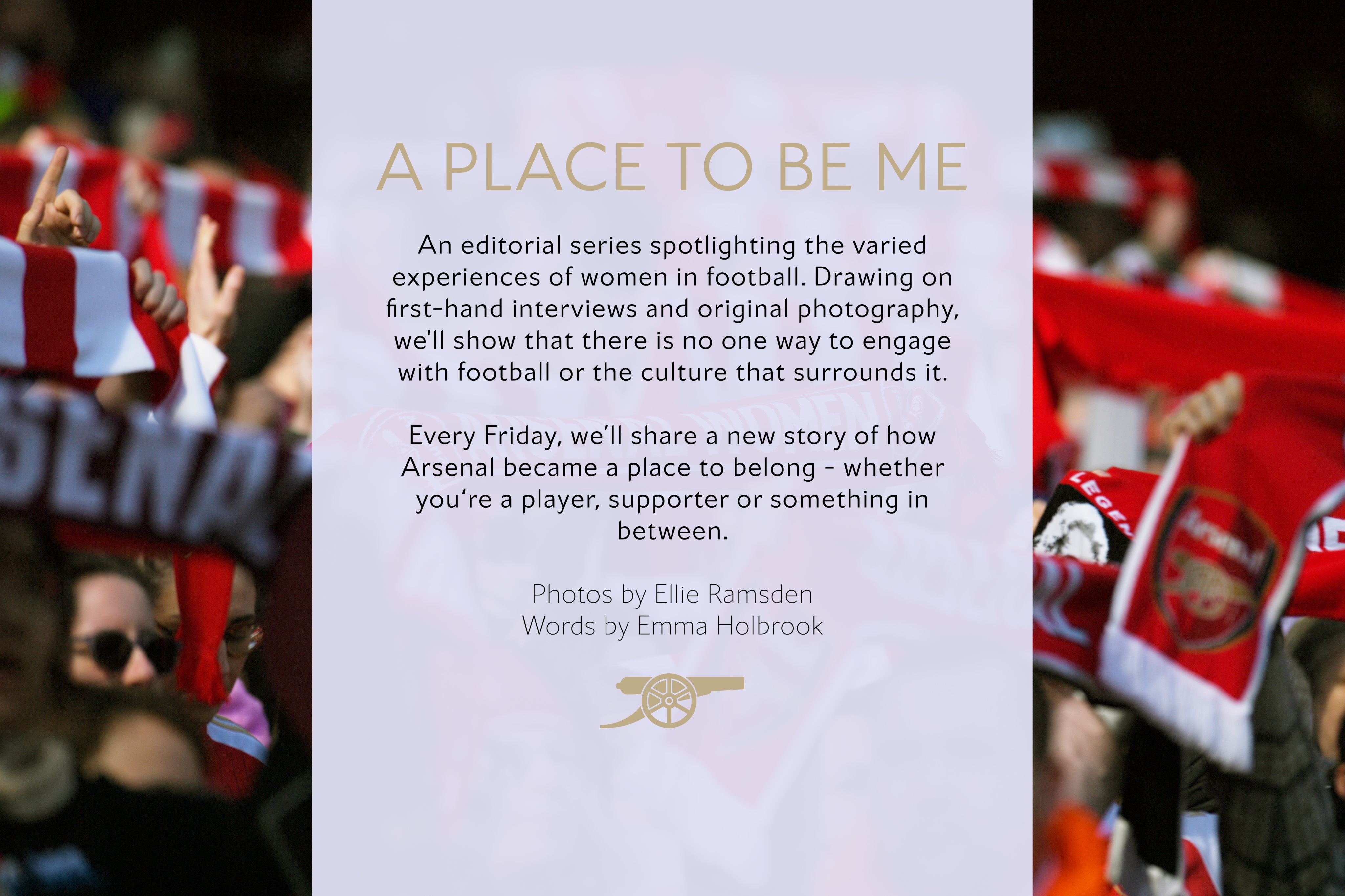

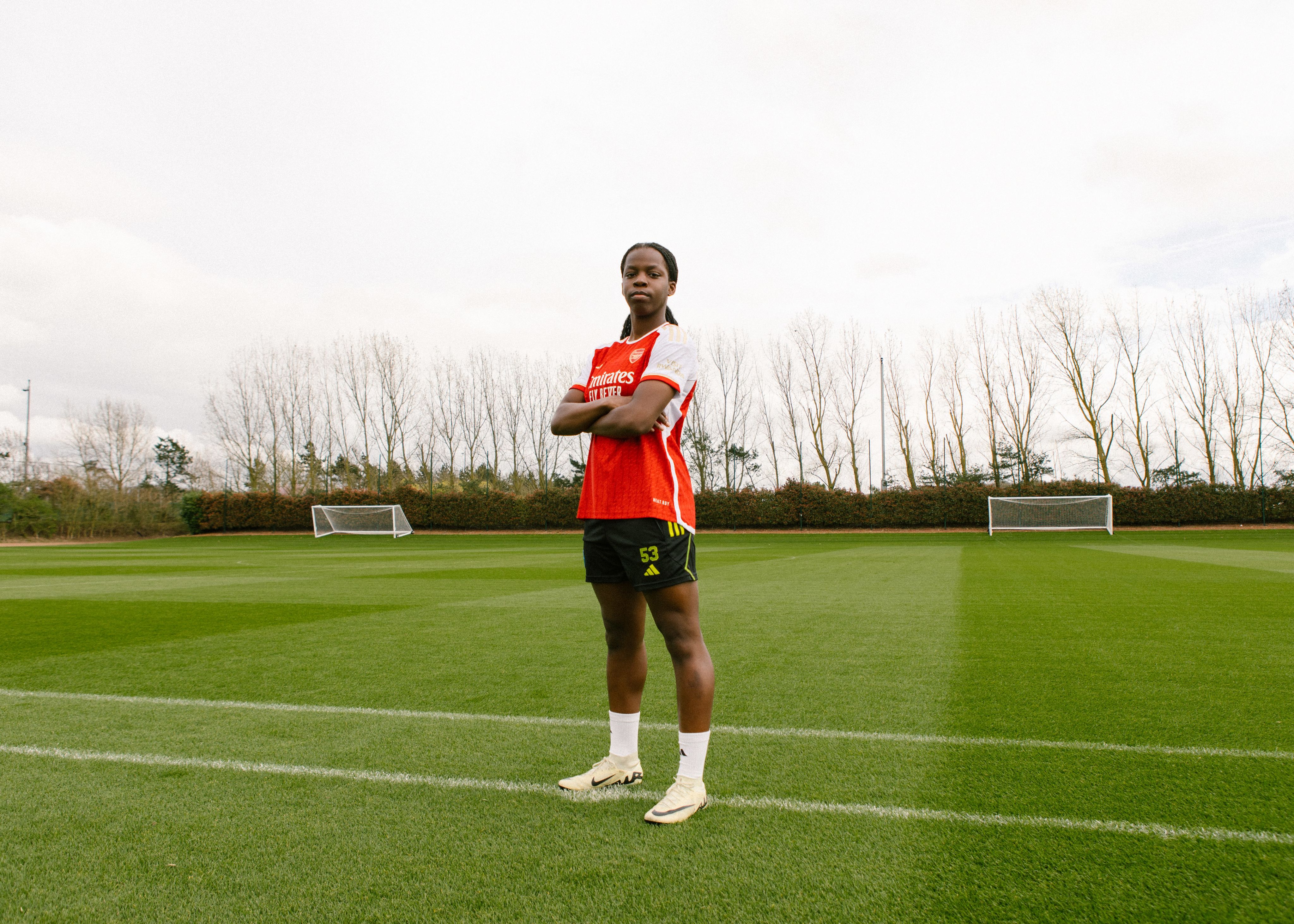
VIVIENNE LIA
17-year-old Vivienne Lia may only be at the start of her footballing career but she’s already lived through a transformative period for women’s football.
She started to kick a football at the earliest possible opportunity and even when it became difficult for girls to play, our club’s most recent senior debutant wasn’t ever put off.
“I fell in love with football when I was about two years old. I’m the youngest in my family and all my siblings played so I just followed them along.
“I think the love I had for football when I was younger is still the same to this day. If I ever lose that love, then I’ll know that’s it! But I don’t think that it will ever go away.”
Despite finding football early, it was a role model from a different sport who had the biggest impact on Vivienne growing up. Serena Williams inspired her on and off the court and she grew up with twin sporting, though she admits that tennis never really came close to overthrowing football.
“Being in a team, it's you and your mates working hard and with an individual sport, it's not the same. Everything's on you. One of the reasons I ended up sticking with football is how much I enjoy that collective.”
There were still plenty of footballing heroes. The otherworldly creativity and flair of Lionel Messi and Ronaldinho made Vivienne fall in love with football over and over again, but growing up in an era of accessible women’s football also meant that she had heroes a little closer to home. One of those players was Arsenal legend, Jordan Nobbs.
“Even though I’m not a midfielder, I always loved Jordan. The way she would play on the ball, her dribbling, her vision - I admired that so much.”
“I knew I wanted to be a professional footballer from the beginning. Even when I wasn’t sure that it would be possible, I wanted to stick with it and see what happened. Then I grew up and there was an actual pathway for women’s football.
“The game was still hard to access, particularly when you were trying to track down video footage because the matches weren't always recorded. I live in North London and Meadow Park's not that far, so I'd urge my mom to let me go and watch the team. Not that long ago, going in person was still the only way to consistently watch the women’s game.
“When I first started secondary school, that's when women’s football started to be televised more and that’s also the year that Arsenal won the WSL. That was so inspirational as a fan - not only because we’d won the league, but also because I’d been able to watch it happen.”
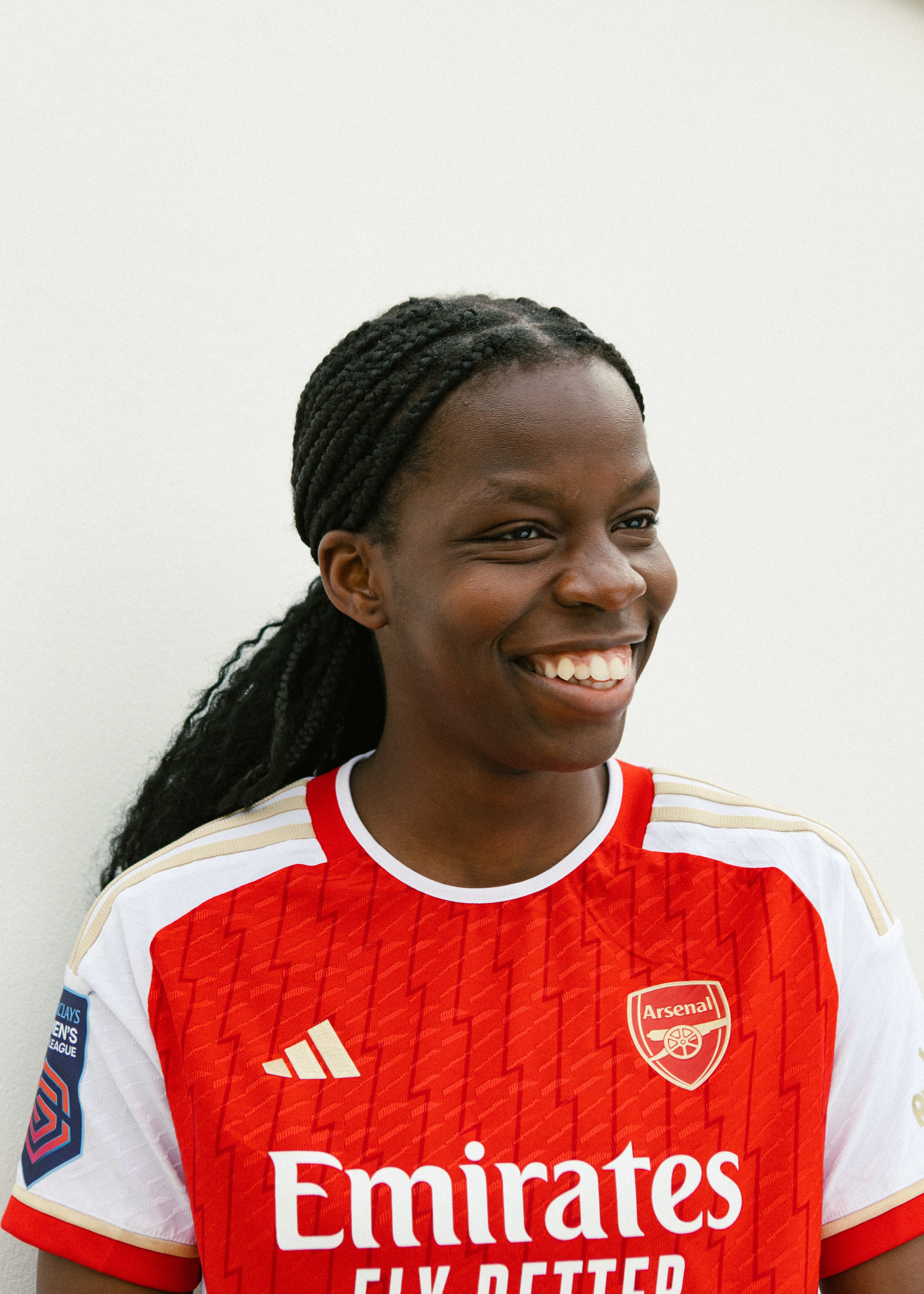
These days, it’s easier than ever before to follow women’s football and Vivienne still watches it - and studies it - whenever she gets the chance.
“That's one thing that my family and friends say all the time: ‘You’re always watching football!’ But I just love it. Whether it’s in person or on my phone, men’s games or women’s games - I watch football as much as I can.
“Of course, it’s not just for fun, because I’m going down the route of becoming a professional footballer and I want to learn from different players. I analyse how different teams play different styles of football, and how individuals show different qualities. You can pick up so much from it.”
Vivienne has grown up as a player and a person at the Arsenal Women's academy, an experience she shared with a close-knit community of young Gunners.
“Within the academy, we're all family because we’re with each other constantly and have watched each other grow up.
"We’re all chasing the same dream and the same passion, so it's easy to connect with your teammates, but we also genuinely love spending time with each other. It’s the same with the first team, too, who are super close. That’s how our club works.”
The young winger made her first senior appearance this season, coming off the bench and impressing in our 4-0 win over London City Lionesses in the Conti Cup. The step from the academy to the first team is far from insignificant but Vivienne is characteristically taking it all in her stride.
“At first, it was overwhelming because all of a sudden, you're in the same room as so many world-class footballers that you’ve always looked up to. It was a bit of a culture shock! But all of the team have been so amazing and made sure that I settled in.
“They always check in and ask me how I’m feeling. Kim is always there to listen or just be there and Jen Beattie was a go-to person, as well. I feel like I can speak to anyone and that just shows how close our team is.”
“Arsenal means so much to me. It’s such a special club that I’ve supported all my life. Off the pitch, everything the club does in the community is amazing and we’ve always been trailblazers and pushed the game on the pitch too. All the values I have as a footballer are Arsenal values too.”
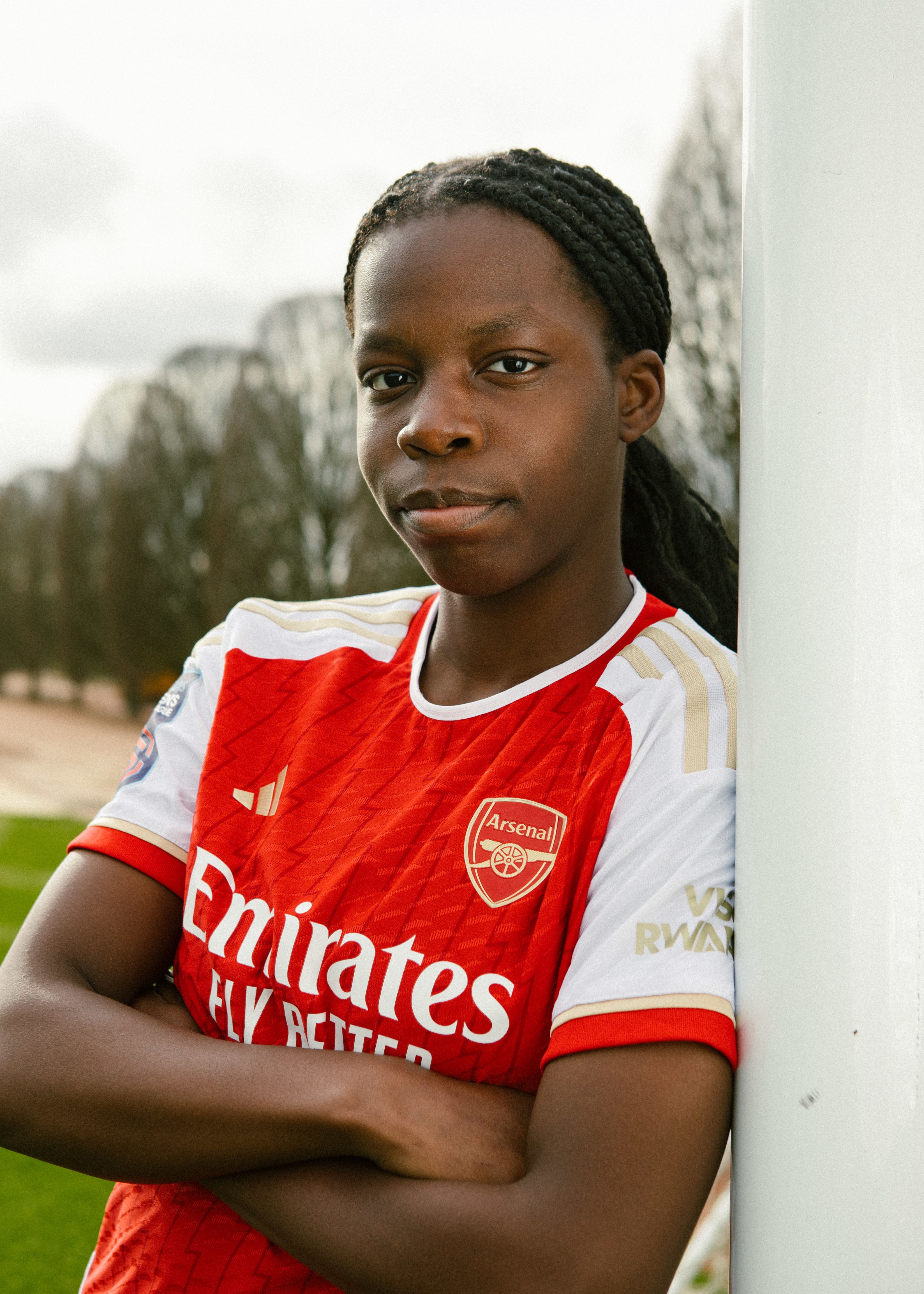
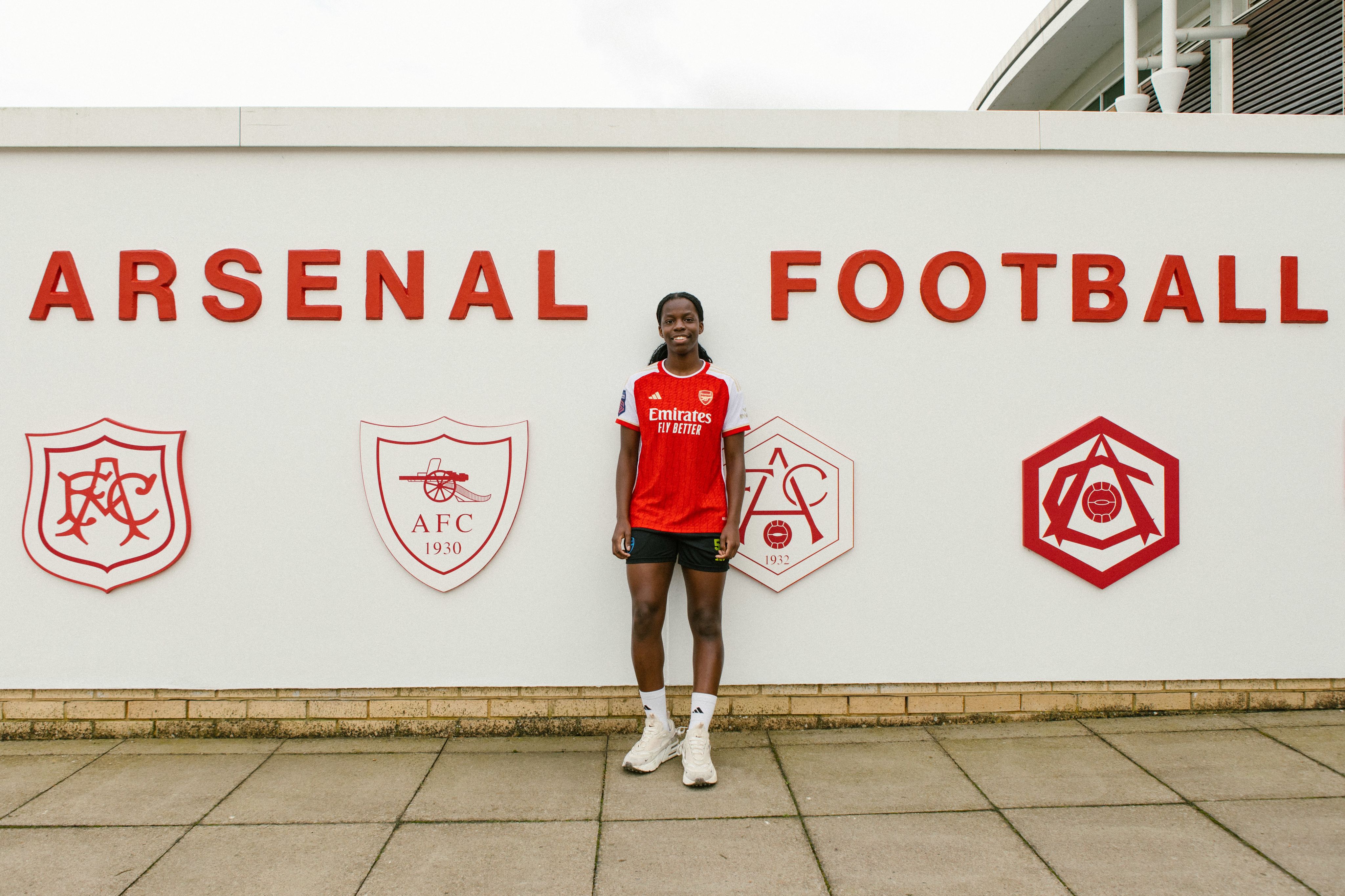

MARRAL & STEVIE
For Marral and Stevie, the stories of how they fell in love with football, lost touch and found their way back, are startlingly similar.
The two friends now spend their weekends playing for Baesianz FC, an inclusive grassroots football team designed to bring players of Asian backgrounds together. They both follow Arsenal Women at Emirates Stadium and Meadow Park alike. They’re diehard fans of the Lionesses. Yet without the evolution of women’s football, the game might well have been something confined to their youth.
“I started playing at the age of eight or nine,” says Marral (pictured right). “It wasn’t always the friendliest but I’d play in the playground with the boys until one day, my friend brought her own football into school. We began playing together and within weeks, her stepdad set up a girls' team at a local club called Harrow St Marys. At under-9s level, we were obviously terrible, but that didn’t last - by under-16s, we’d won the cup!”
Stevie (pictured left) also came to football early - “I was so young that I can’t remember how old I was,” making plenty of friends (and some Man United enemies) along the way.
“Before school, my mum would drop me off an hour early so I could play football on a tiny sliver of the street with one of those giant tennis balls. We’d chat about our favourite footballer’s haircuts and which pair of boots we’d love to own one day. It might not sound like it, but it was a meaningful identity for me to have.”
One of Stevie’s earliest Arsenal memories came during a pre-season friendly against Barnet in the Invincibles era. “You used to be able to go to the front when you were really little and I remember completely freaking out because Thierry Henry was warming up right in front of me. And then he winked at me! Watching that team play was just magic. The way they passed the ball was poetry in motion.
“Having Arsenal in my life has always felt special. Both my dad and my older sister were massive supporters so watching Arsenal play made me feel so close to my family.”
Family ties also brought football into Marral’s life with a football-obsessed dad her biggest source of inspiration. Her dad would religiously watch any football he could but never tied his colours to one team. The decision to follow Arsenal was her own.
“My best friend growing up was a Man United fan and I remember going round to his house to watch Arsenal play United, around 2002. Before the game started, I decided then and there to support Arsenal. I’m pretty lucky that my entry into Arsenal came when it did - it became pretty obsessive after that, thanks to the Invincibles!”
Women’s football, meanwhile, was significantly harder to find. “The game wasn’t accessible or advertised at all, so you had to actively search for it. That’s when I came across Rachel Yankey - she became my idol.”
Despite playing until university, Marral fell out of love with the game and for a large part of her twenties, football no longer played a role. Stevie also continued to play into her teenage years but trying to balance the academic pressures of secondary school with the commitment of a club side became too much.
“My mum had to drive me for over an hour each way after work, just to take me to training, which she was always happy to do but it wasn’t fair on her. Football used to be my top priority but it just stopped being as fun as it once was. And because I lost touch with playing football, I also lost touch with watching it.”

But football doesn’t give up that easily. Marral started to dip her toe back into football with casual five-a-side games with mates and as luck would have it, was offered a golden ticket to the Women’s Euros final at Wembley.
“I remember sitting with my friends Daisy and Halimah before the match and saying, 'If England win, this is going to completely change women’s football in the UK.' There was still a part of us that didn’t believe it because the game hadn’t had the investment or attention the men’s game had.
“But then it happened: England won and all of a sudden, everyone was interested. My friends and I started writing love letters to women’s football on social media. So many friends who stopped playing for various reasons brought back all these wonderful, shared stories - it was so beautiful.”
“I got into the Euros near the end and couldn’t believe how well England were doing - I was used to heartbreak!” says Stevie. “Before the final, I organised a kickabout with a few friends, so many of us hadn’t kicked a ball for ten years but it unlocked something. That summer was unbearably hot but we could not stop playing.
“Every pub was already booked out, of course, so we watched the final at my place and when England won, it was a feeling I’d never experienced before. I knew from that moment on that I had to find a group of passionate people similar to me who loved football and loved Arsenal this much.”
Like so many others across the country, Marral and Stevie began searching for a route back to the game they’d loved as kids. Only this time, the game became more than just a game: it became a place of belonging.
Stevie was scrolling through Instagram, stumbled on Baesianz FC and it felt a little like fate. “I luckily joined just before the club blew up - there’s an extremely long waiting list now which shows just how much demand there is, especially for people with an Asian background. You don’t see many professional Asian players, let alone Asian women’s players.
“It’s created this community of people who would otherwise have been forgotten. I knew football was a missing hole in my life that I needed to fill. I’ve witnessed so much love from this network of people who are so willing to help each other out. I’m just glad I get to be a part of it.”
“The Euros made me realise that I wanted football back,” says Marral. “My friend told me about Baesianz FC, a queer-inclusive women’s, trans, and non-binary team based in East London. It was perfect. My football journey up until that point hadn’t been very diverse, so it was special to find a team with a strong purpose.
“I started following Arsenal Women and decided to give all my energy to the women’s game. You become so invested in these amazing players and you want them to do well.
“There’s a level of access now that we didn’t have growing up. You’d have to dig hard to find the Rachel Yankeys. Today, you’re in the stands and see five-year-old girls shouting for Lotte Wubben-Moy or Katie McCabe. For a whole generation of young girls, they finally have that representation.
"I think we’re so lucky to have players like Lotte who are changemakers on and off the pitch. There’s still a way to go to make sure that there is diversity on the pitch, but I do believe we’ll get there as long as proactive conversations keep happening and it remains a key priority. As fans, it comes from a place of love to see our club reflect our communities in London.”

“I think both men’s and women’s football is the greatest,” says Stevie. “I wear my Arsenal shirt in a pub, abroad or wherever and it starts so many interactions. But the women's game is particularly welcoming. Even for friends who don’t usually watch football, I’ve managed to get them down to the Emirates and because they had such a good time, they keep coming back.
“I brought my mum to the recent WSL match against Man United. She’s seen me play when I was younger, of course, but I think that was her first-ever proper football match. And by the time Kim Little scored that penalty, she was screaming in excitement like the rest of us. That was a really special moment because ordinarily, she might be overwhelmed by the crowds but I knew that it was a community of people where she’d feel really comfortable.”
“I think it's great that it’s so accessible. People who otherwise wouldn't get to go to games get to see The Arsenal play at the Emirates.”
Marral agrees: “The fact that the tickets are so affordable for women's games, even at the Emirates, I just feel like that's the energy that football should have. It brings all kinds of people in.
“Everyone describes the atmosphere at women’s matches in different ways. It’s very family-friendly, but I don’t want to lean too much into that because we are ultimately fans of a sport. We should be competitive. It’s great to be super passionate at a match and that also doesn’t need to detract from a family’s fun day out. You can have both.”
As women’s football continues to bring in huge crowds and devoted interest across the world, new communities around the sport are flourishing. But what is a place to belong without a feeling of safety?
“I don't notice my race or my gender when I come to a women's football match in the way I may notice those things in other spaces,” says Marral. “Women’s football is an inclusive, queer and safe environment and you can see that reflected in the different types of people who come. Young families, teenagers, people from different backgrounds. That’s the community aspect of the club I really love.”
“My rekindled love for women's football goes hand in hand with Arsenal. There is a really lovely energy where I live in North London - when you see an Arsenal shirt, you feel connected.”
Stevie's love of Arsenal is deeply wedded to a sense of place. “Being in London, with the Emirates on our doorstep, I think people can take that for granted. It really is an incredible thing to be able to see the people that you worship growing up doing good outside of football as well. I think Arsenal are especially strong at that. Our players are spokespeople, constantly fighting for change and I have a lot of respect and admiration for them.”
For the pair of friends, football began with family and now it’s come full circle.
“Football is such a beautiful way to bond,” reflects Marral. “When I was a kid, my dad used to take me to training and matches every weekend, come rain or shine. Ever since the 2019 World Cup, my dad has got super into women’s football – and I’ve joined him in recent years! I bring him to Arsenal matches, and I’ve even convinced him to do a joint road trip to the Olympics this summer.”
“Arsenal created a massive bond for me and my dad when I was young,” Stevie shares. “Now we have that back again. He goes to the Emirates to see Arsenal Women play on his own and we analyse the games afterwards. It’s re-ignited such a special thing in our lives. Younger me never would have thought it would be the women’s game to bring that home.”



SUSANA FERREIRA
Supporting a football team can often feel inevitable, dictated by family ties, geography and identity before we’re even born. When it came to Arsenal, Susana Ferreira doesn’t think there was ever an alternative. The north Londoner has repped the red and white from birth and never once looked back.
“My dad was a massive Gooner. I was born in ‘93 and he made me an Arsenal fan from that moment on,” reflects Susana, a photographer and youth worker.
“We only lived about three roads over from the old Highbury but even when we moved to Manor House, halfway between Highbury and White Hart Lane, it was never even a discussion. Luckily, there’s still no doubt that I chose the right team!”
“As a kid, I wasn’t fortunate enough to go to games but I’d always watch on TV and make my dad take me down to the shop in Finsbury Park. I’d buy Arsenal bobbleheads, pencil cases… anything I could get my hands on. I had team photos plastered all over my bedroom walls which I’m sure my mum loved.”
Susana grew up as a goalkeeper, idolising a certain moustachioed, ponytailed Arsenal legend. That childhood love is now immortalised in ink, as one of Susana’s several Arsenal tattoos.
“David Seaman was my guy! There weren’t any female keepers to look up to on TV so I just became obsessed with him.”
Throughout the 2000s, Arsenal Women - then Arsenal Ladies - were utterly invincible on the pitch but difficult to follow off it. In a world before the women’s game became professional and consistently televised, aspiring female footballers would search for glimpses of representation. Luckily, Susana has early memories of our side thanks to a unique connection.
“I was a pretty fortunate kid because from the age of 10 to 16, my football coach was Kirsty Pealling.”
Pealling, one of our longest-serving and greatest-ever players, joined the club at just 12 years old and spent almost two decades as a fearless full-back in north London.
“We went to see Kirsty play a couple of times and I remember paying pennies for tickets, if that. That was my first memory of the women's team.
“As I got older, the game became so much more accessible. The matches would be on TV and I could afford to make the journey down to Borehamwood to properly follow the team. I haven’t stopped since.”


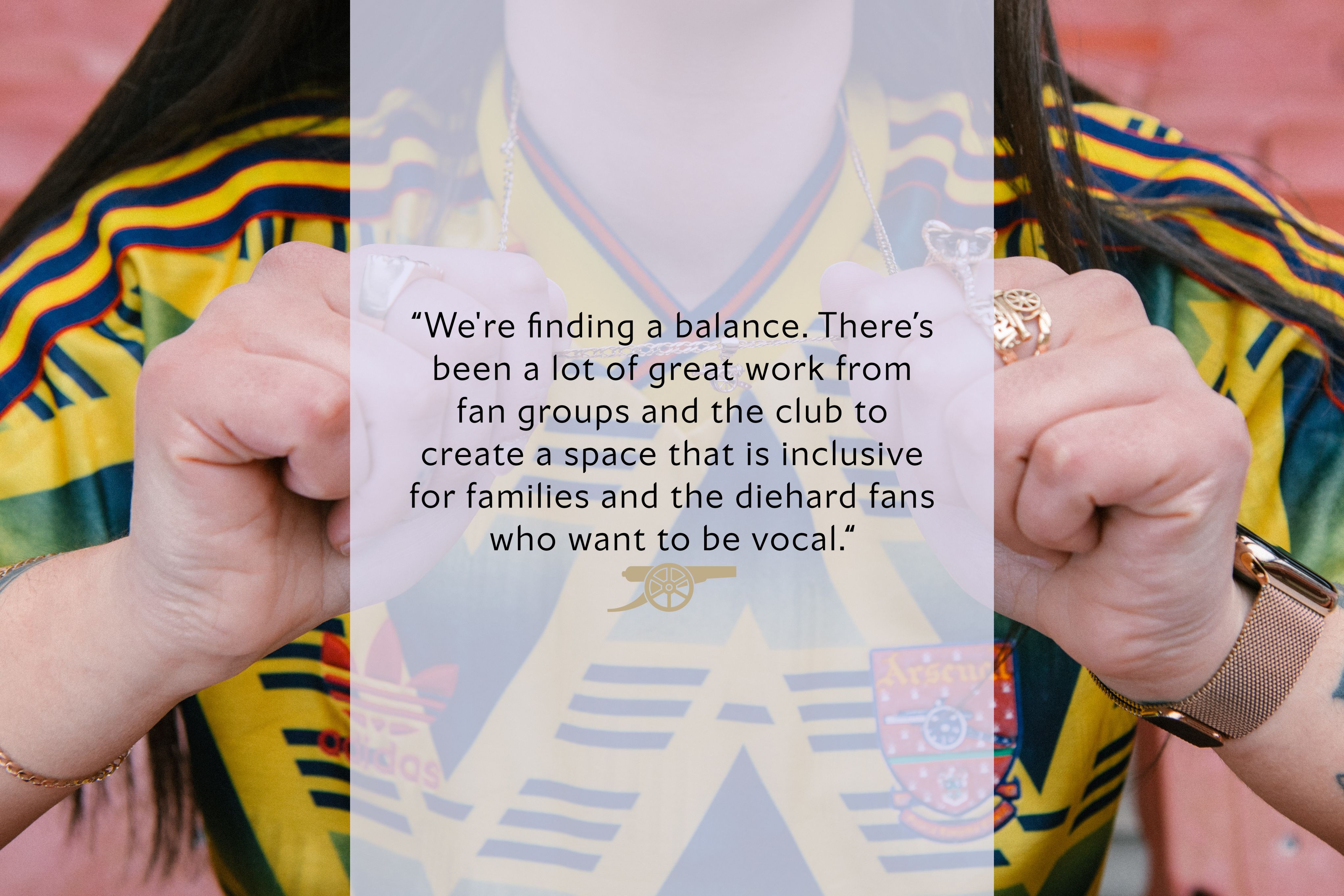

From one love sprung another and Susana now makes those trips down to Meadow Park to photograph the club she’s supported all her life. As part of our Creator’s Club, she’s also documented recent games at Emirates Stadium, watching our once triple-figure fanbase grow into something unstoppable.
“Football actually got me into photography. For someone who loves capturing people’s emotion on camera, there’s literally no better place to do that than at a football match.
“Whenever I’d go to a game, I’d bring a point-and-shoot camera with me to take pictures of my friends. I started posting them and one day received a message from the guys at Arsenal offering me the chance to shoot a match day.
“To be a fan my whole life and then get the opportunity to take pictures for the club, it’s pretty surreal. It’s been a 360-degree journey: I started taking pictures at Arsenal games and now I do it for work.”
Whether she’s following our men’s or women’s team, Susana’s love for The Arsenal feels the same. But as the women’s game continues to reach new people and broaden the definition of what it means to be a football fan, that sense of belonging only grows too.
“There aren't many differences in how I support the men’s and women’s teams. The highs are the highs and the lows are the lows.
“For me, I’ve always felt comfortable enough to go to men's games on my own, but I know that's not the case for many people. The women's space can feel a lot more inclusive.”
“The stage we’re at with the game nowadays, particularly at Arsenal, there’s a huge community built around it. We meet hours beforehand, we march together to the stadium and we chat about the match on the group chat afterwards. Only a couple of years ago, I might have just gone to games with a few mates and then headed to the pub. Now, there’s a whole community.
“We're getting to a place where we're finding a balance. There’s been a lot of great work from fan groups and the club itself to create a space that is inclusive for families and kids but also for those diehard fans who want to be vocal and enjoy the game.
“It’s tricky to find an atmosphere that works for everyone. But this season especially, we’ve found a way to bring everyone together.”
Ellie Ramsden is a photographer based in London, focusing on portrait and documentary photography.
Much of Ellie’s work aims to stimulate discussion, question stereotypes and present alternative perspectives. In her personal projects, she documents British subcultures and communities and explores themes such as community, youth culture, gender equality and alternatives to the mainstream.

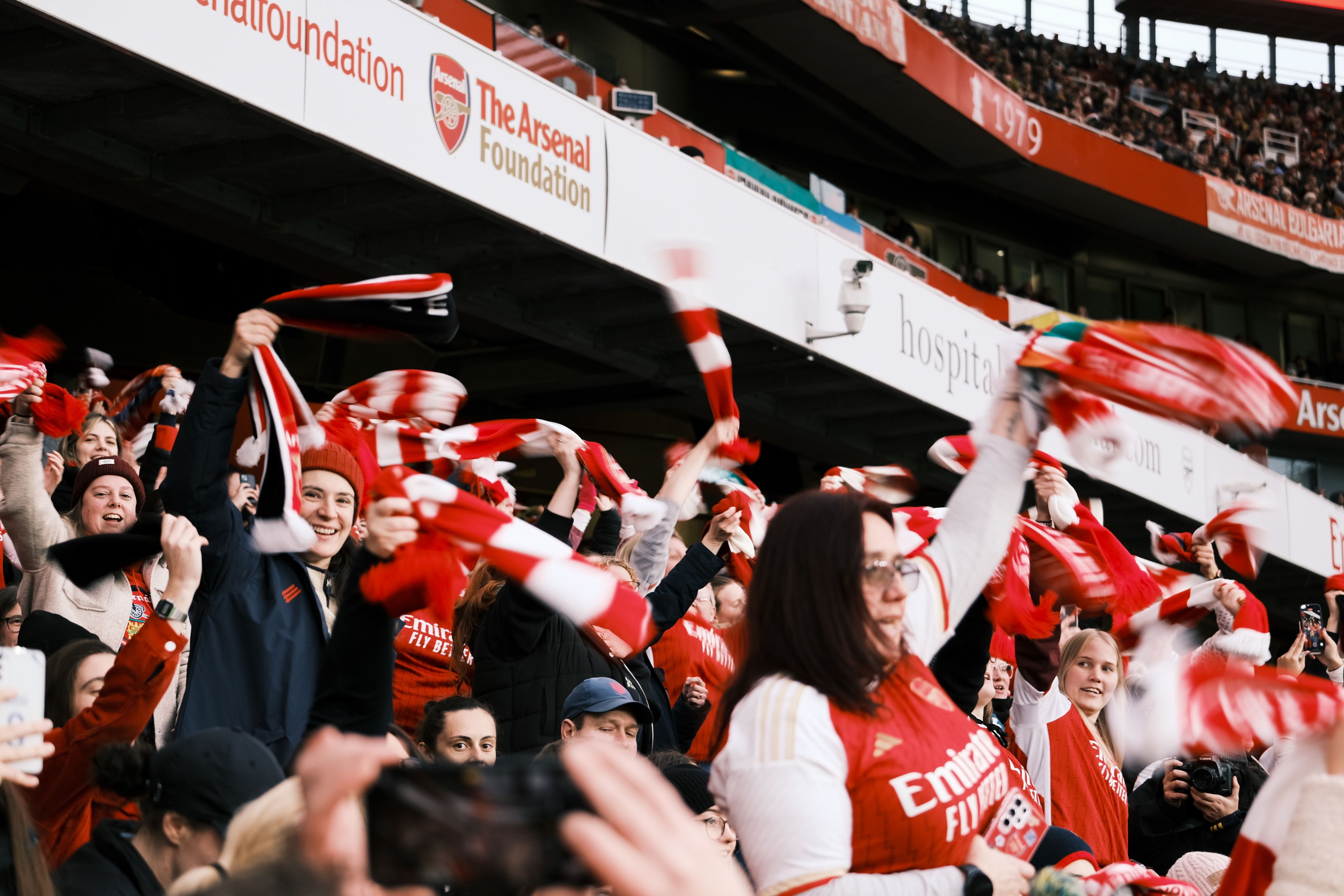
“For someone that loves capturing people’s emotion on camera, there’s literally no better place to do that than at a football match.”
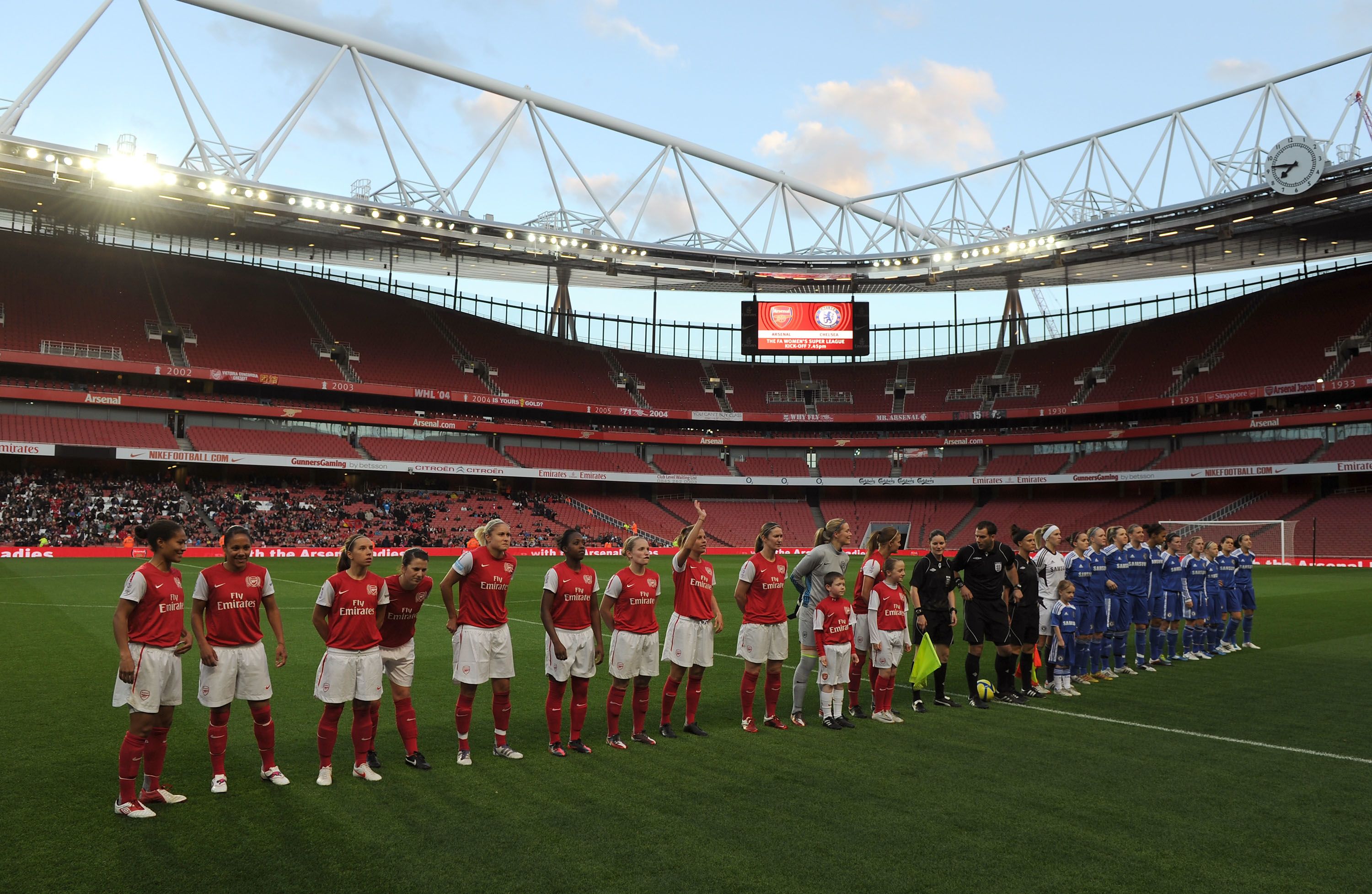

Arsenal 4-1 Chelsea
24 April 2008, FA Women's Premier League
Attendance: 5,285
A year after our women's side first took to the pitch at Emirates Stadium in a 3-2 win over Everton, we were back in N5 to host London rivals, Chelsea.
Over 5,000 people were in attendance as we hit four past the Blues to clinch a fifth-successive league title and add more silverware to the trophy cabinet.
A brace from Karen Carney and a penalty from Kelly Smith secured the three points but the match would also mark Kim Little's very first goal for the club, aged only 17.
Who else happened to be in attendance that day? A certain Leah Williamson accompanied our captain Faye White as a mascot.
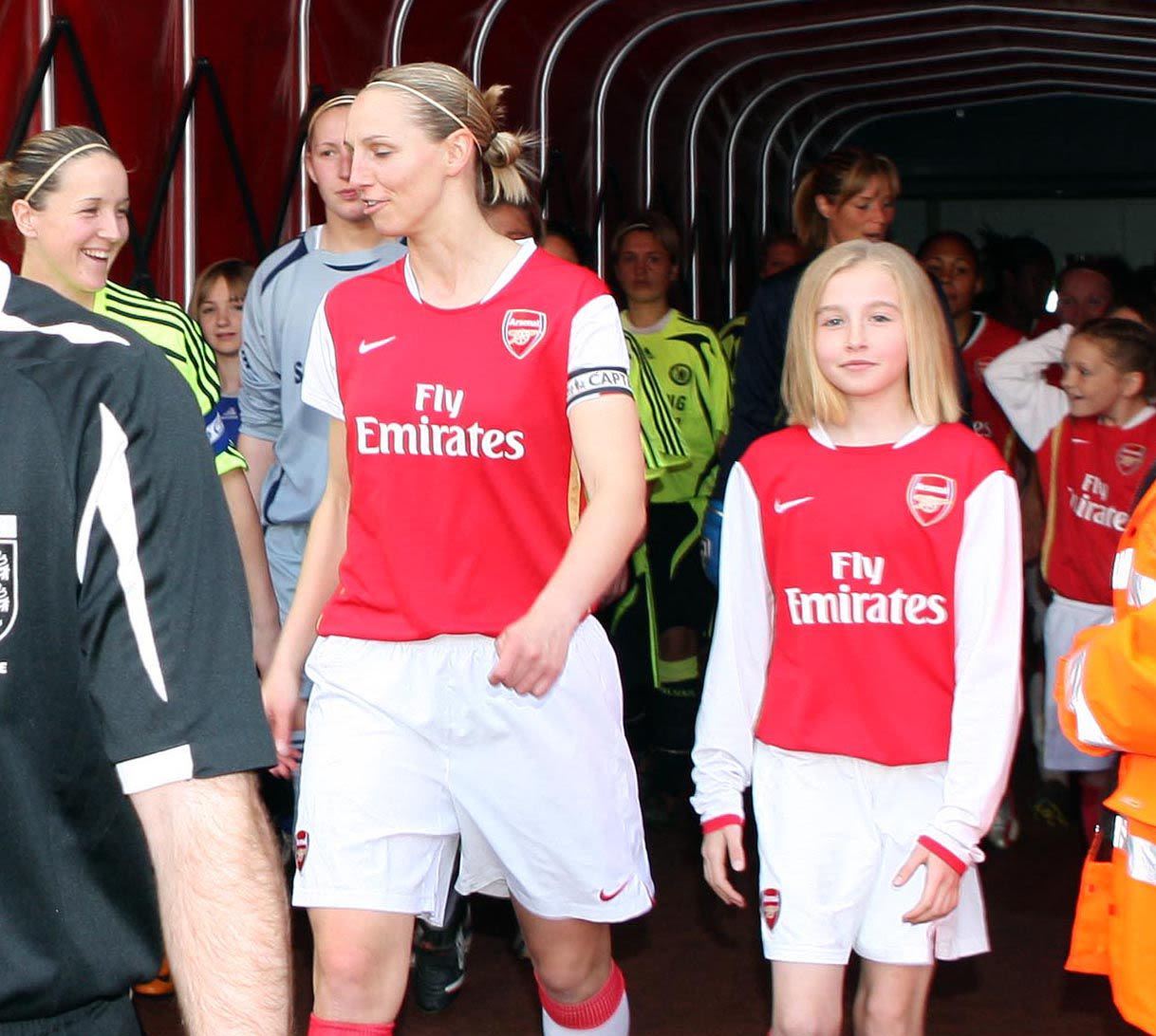
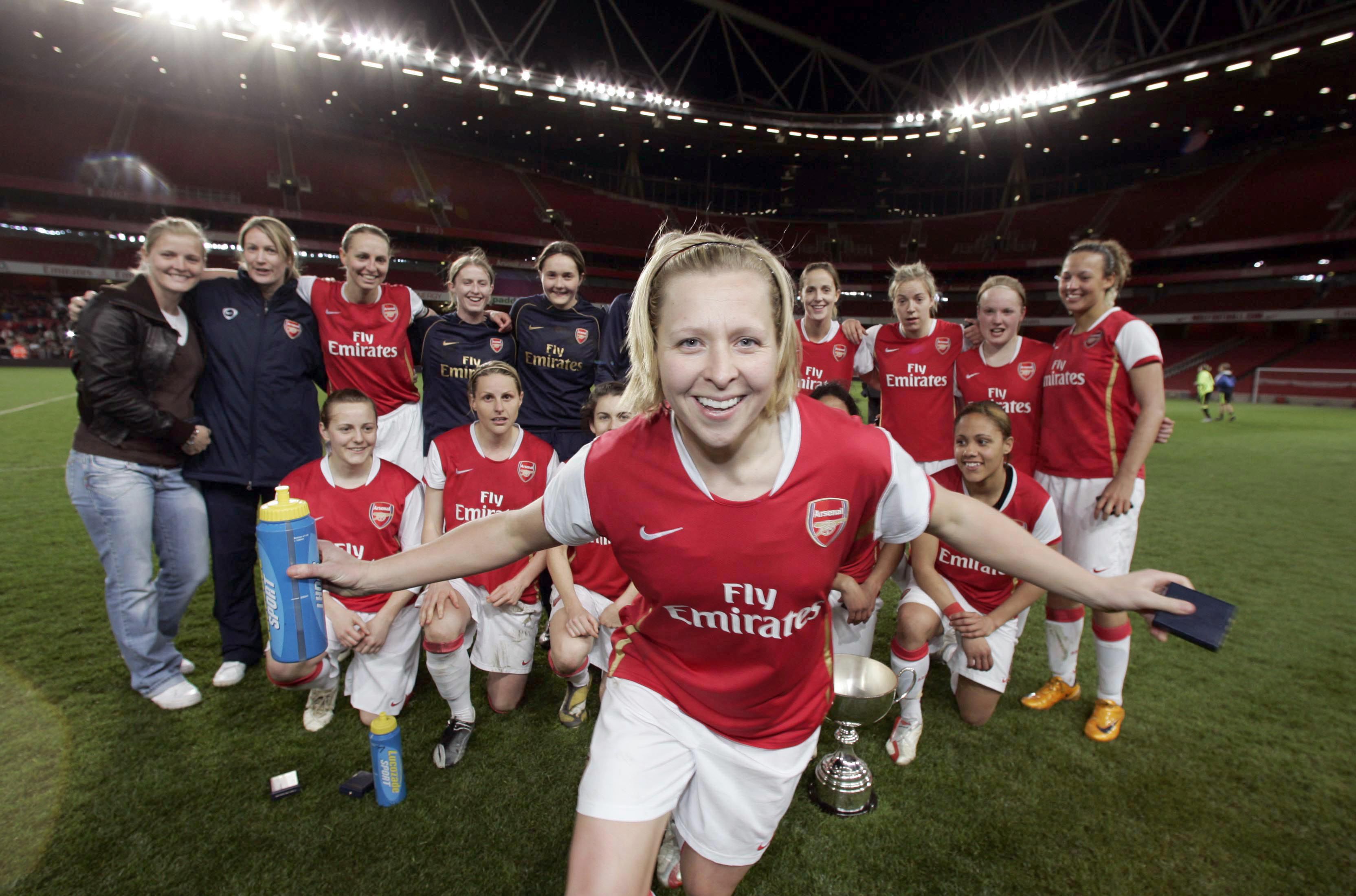
Arsenal 4-0 Tottenham
24 September 2022, FA Women's Super League
Attendance: 47,367
Flash forward over a decade later and the demand for women's football had sky-rocketed. In the wake of England's fantastic victory at the UEFA Women's Euros 2022, our very own Lionesses Leah Williamson, Beth Mead and Lotte Wubben-Moy helped bring the crowds home to north London for our WSL season opener.
Beth Mead provided a dream start for our supporters with a goal in the opening five minutes. Vivianne Miedema slotted home on the stroke of half-time to extend our lead, before Brazil's captain Rafaelle joined in to make it 3-0.
Miedema then doubled her own tally in the 68th minute to complete our derby day delight.
The 47,000-strong crowd smashed the previous attendance record set by our local rivals at the Tottenham Hotspur Stadium for the 2019 north London derby.
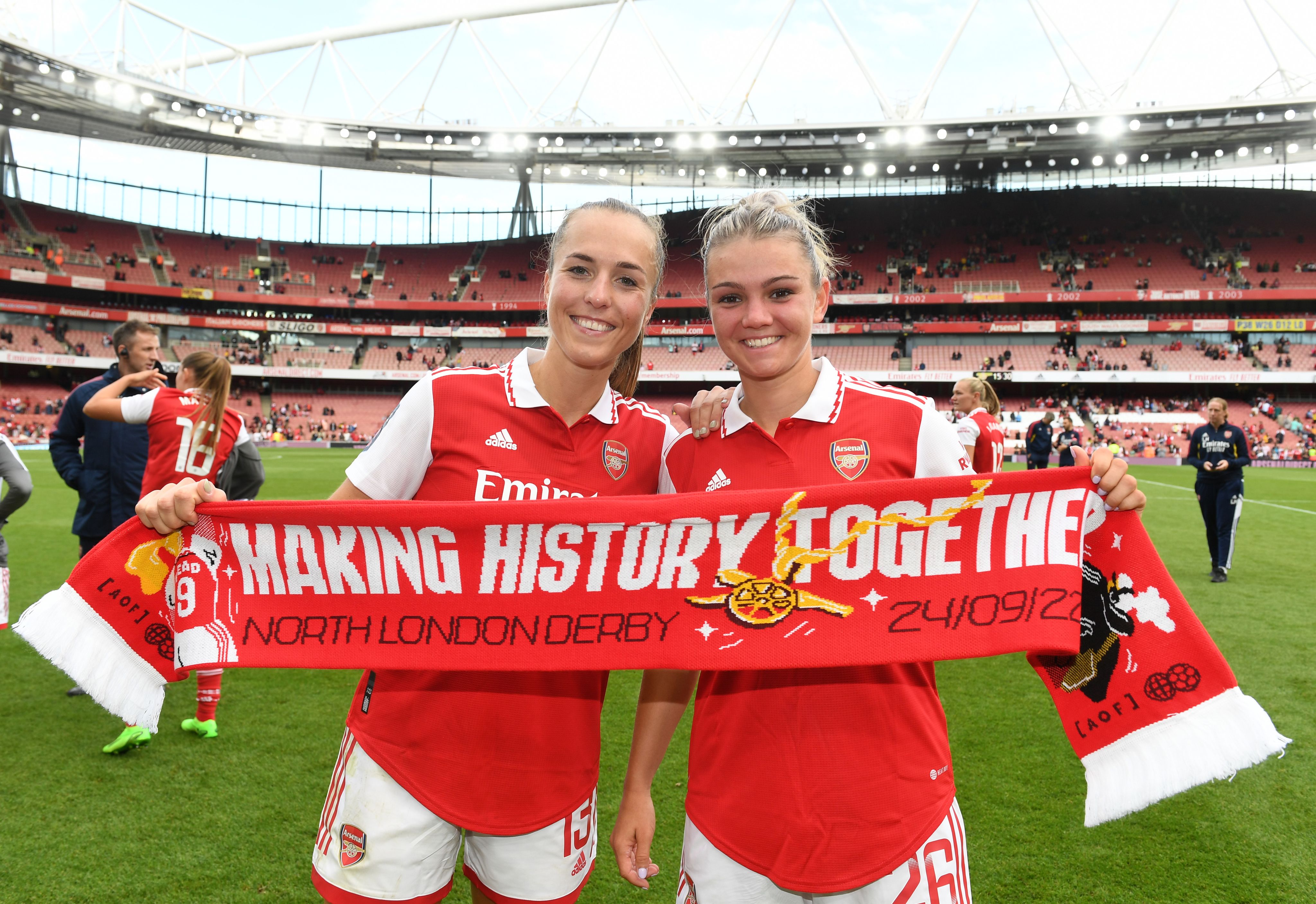
Arsenal 2-3 Wolfsburg
1 May 2023, UEFA Women's Champions League
Attendance: 60,063
Our very first Emirates Stadium sell-out. A historic summer evening saw our squad give everything they had to try and reach the UEFA Women's Champions League final for the first time since 2007.
We headed into the second leg of the tie 2-2 on aggregate after a dramatic comeback in Wolfsburg. The German side had knocked us out of the competition the year before and there was a score to settle.
Stina Blackstenius gave us the lead early on but we were brought crashing back down to earth by former Gunner Jill Roord and Alexandra Popp. With only 15 minutes left on the clock, a magical header from Jen Beattie levelled the scores and sent us to extra-time. But the full house's delight was to be short-lived.
Just as a penalty shootout seemed inevitable, the visitors struck a hammer blow through Pauline Bremer. A chance at Champions League glory was snatched from our grasp but our spirited semi-final performance would remain one to remember.
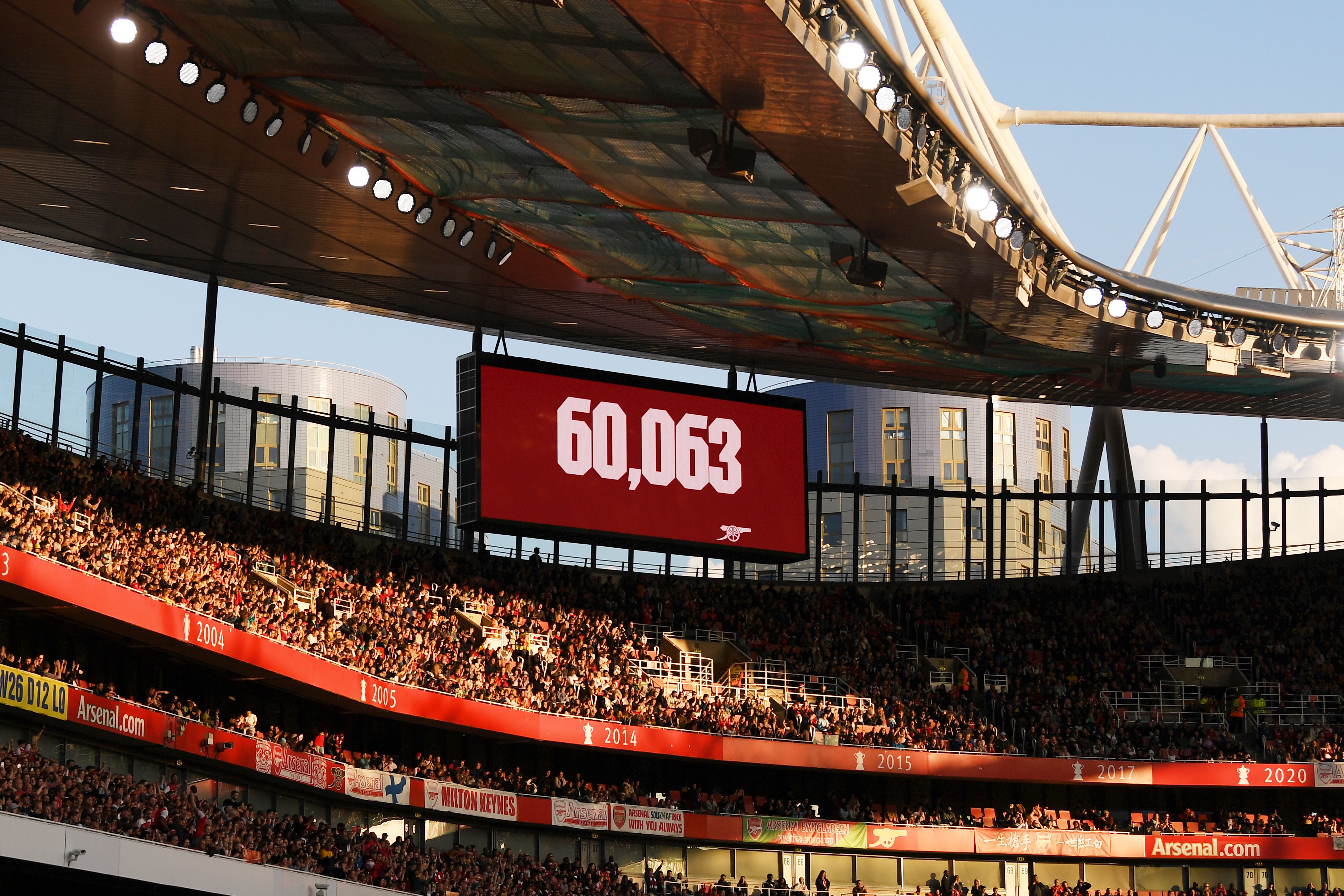
Arsenal 4-1 Chelsea
10 December 2023, FA Women's Super League
Attendance: 59,042
Tantalisingly close to another full house at Emirates Stadium, over 59,000 people watched our breathless victory over title rivals, Chelsea.
Beth Mead, who had recently returned after a devastating ACL injury, showed absolutely no sign of rust when she scored the opener, causing the crowd to erupt in the way only she could.
Chelsea hit back almost immediately through Johanna Rytting Kaneryd, but that did nothing to quell our momentum. Amanda Ilestedt’s header restored our lead and just two minutes later, Alessia Russo struck with a Thierry Henry-esque finish to silence the away support.
By the time Russo scored her second from the penalty spot, the damage was done. A huge boost to our title hopes and another WSL attendance record broken.
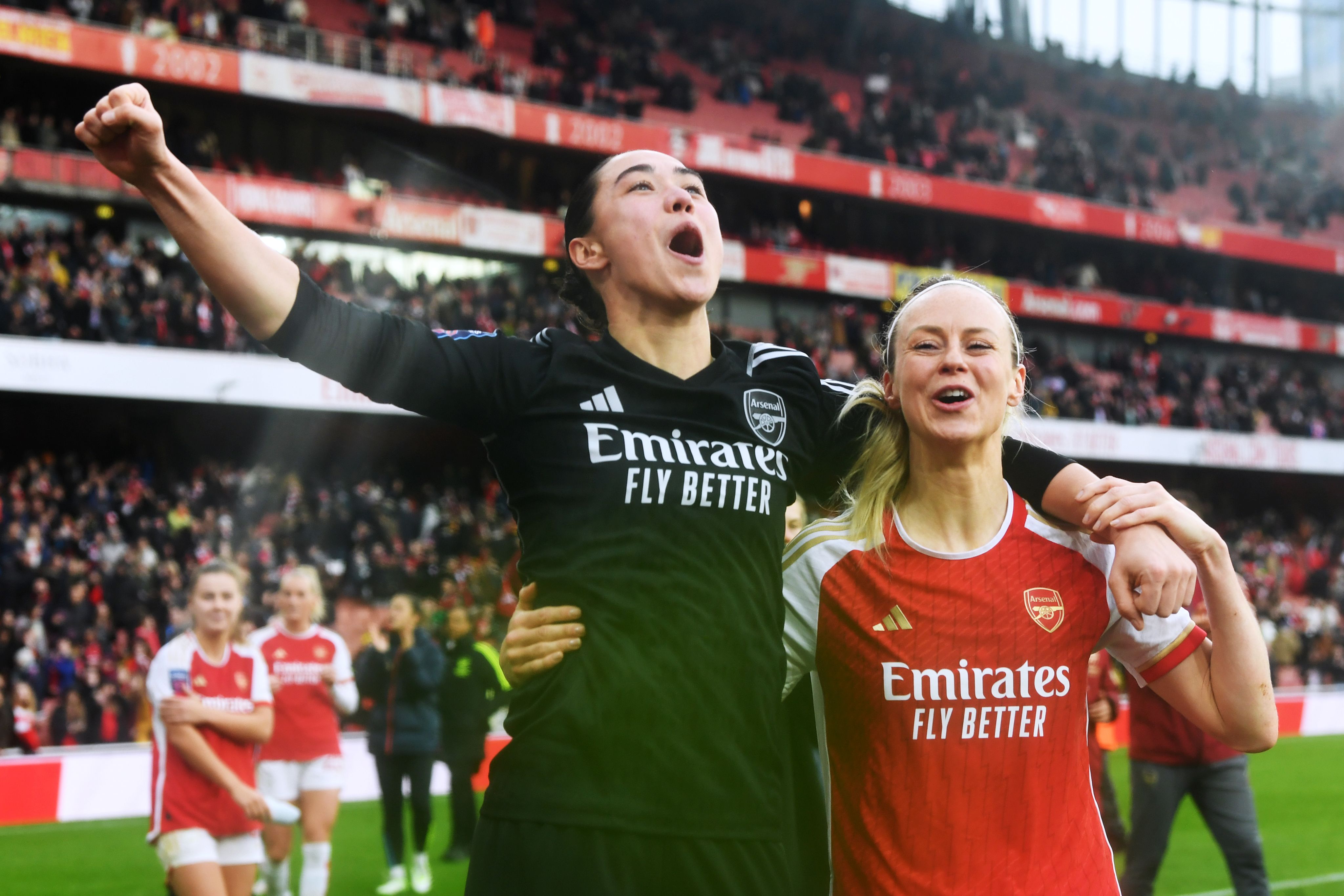
Arsenal 3-1 Manchester Utd
17 February 2024, FA Women's Super League
Attendance: 60,160
After building momentum throughout the season with record-breaking support, home and away, we finally achieved our first Women's Super League sell-out in February.
We sealed the special afternoon with a big three points against Manchester United, courtesy of a true team performance and goals from Cloe Lacasse and Kim Little.
United's forward Geyce turned the ball into her own net following a fierce corner from Katie McCabe and Lacasse doubled our advantage after the half-hour mark. After Beth Mead was unceremoniously brought down in the box, captain Kim Little stepped up to the spot and did what she does best.
Our average attendance this season now sits at 34,997 - higher than 10 Premier League clubs.
